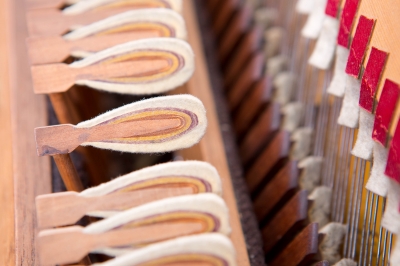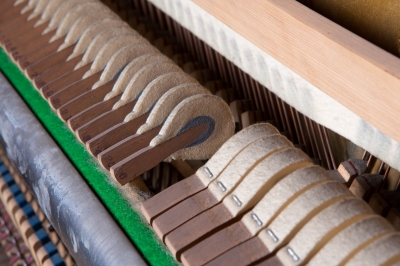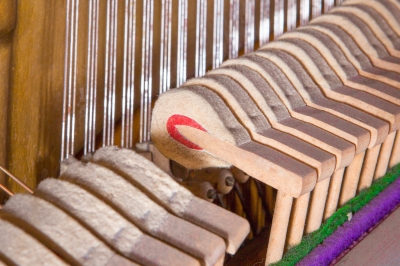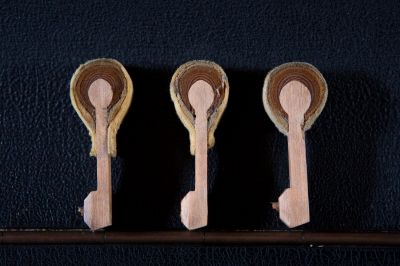About the project
Launched in 2015 by the Institute of Music and Dance, the project showcases over a hundred historical pianos manufactured by Polish and international makers. The instruments are the property of the Andrzej Szwalbe Collection in Ostromecko, the Museum of Industrial History in Opatówek, the Fryderyk Chopin Institute in Warsaw and the Diocesan Museum in Sandomierz. You will find here over a thousand high-quality photographs of the most interesting and beautiful historical pianos which have survived in Poland.
The piano, a status symbol for decades, developed dynamically, especially over the course of the 19th century, and is now an almost perfect device. Its form and musical capabilities were shaped by experimentation and efforts of many minds and hands eager to satisfy the expectations, needs, or even caprices of the musical circles. The history of culture, art, and music all come together on the catalogue cards of each piano, usually equally fascinating and beautiful. Browse through the website to discover impressive Polish collections, two of which – the Szwalbe collection and the Opatówek collection – are very special for their variety. The Fryderyk Chopin Institute's collection is the only one possessing pianos that still resound with music, being used for concerts and recording sessions.
Historical pianos can reveal a great deal about the sound environment of the past centuries. We know the sound of Chopin's pianos – the Pleyel, Erard, Broadwood, and Graf – which helps us to understand his works better. What we need to remember, is that they were not the only instruments produced in the 19th century. Our website presents close to 80 piano-makers, many of them based in Poland, who contributed to the development of the piano. Unfortunately, most of the surviving instruments are unfit to play at this moment. Renovating a piano requires time, money, and expertise – done improperly, it will contort the sound reality forever. Polish piano collections are as rich and versatile as the European ones. If we restore them to former glory, they will treat us to a plethora of registers and timbres that our 20th-century ears have long forgotten.
Agata Mierzejewska
Historical pianos are a part of our cultural heritage and a tangible remnant of our illustrious musical past. They document the role music played in Poles' private everyday life as well as public entertainment in the past centuries. Instruments produced in Poland testify to the achievements of the Polish piano-making industry. Those imported from abroad testify to the Polish music lovers' great demand for this music "gadget", which domestic production could not fully satisfy. These are just a few reasons why you should enter our magical world of historical pianos, and one of the reasons why we should save them for the future generations.
Professor Beniamin Vogel
The creators
Concept of the project: Andrzej Kosowski, director of the Institute of Music and Dance in Warsaw
Coordinator: Brygida Błaszczyk-Podhajska
Curator: Agata Mierzejewska
Photographs: Waldemar Kielichowski
History of the piano, catalogue cards: Professor emeritus Benjamin Vogel, Joanna Gul, Institute of Musicology, University of Wrocław
History of the piano-makers: Professor Benjamin Vogel, Joanna Gul
Reminiscences of folk instrumental practice in Chopin's piano music: Professor Zbigniew J. Przerembski, Institute of Musicology, University of Wrocław
Translation of the Hornbostel and Sachs classification: Professor Benjamin Vogel, Joanna Gul
Classification of the instruments in the database: Professor Benjamin Vogel, Joanna Gul
Interviews with pianists: Agata Mierzejewska
Selection of audio and video materials: Agata Mierzejewska
Translations: Professor Benjamin Vogel, Monika Tacikowska
English language editing of catalogue cards: Monika Tacikowska, Józef Jaskulski
Blog editor: Agata Mierzejewska
Editor of the Education section: Brygida Błaszczyk-Podhajska
Website design and production: Studio Robot
The creators of the website would like to thank:
Marzena Matowska, director of the Municipal Culture Centre in Bydgoszcz
Andrzej Gawroński, head of the Palace Unit, Palace and Park of Ostromecko
Jerzy Marciniak, director of the Museum of Industrial History in Opatówek
Dr Ewa Kłysz, Museum of Industrial History in Opatówek
Dr Artur Szklener, director of the Fryderyk Chopin Institute in Warsaw
Wioleta Wnorowska
Andrzej Doręda
Mariusz Klimsiak, Feliks Nowowiejski Academy of Music in Bydgoszcz
The exhibits belong to:
The Fryderyk Chopin Institute in Warsaw
The Andrzej Szwalbe Collection of Historical Pianos in the Palace and Park of Ostromecko
The Museum of Industrial History in Opatówek
The Diocesan Museum in Sandomierz
Audio and Video recordings:
The Fryderyk Chopin Institute in Warsaw
The National Library in Warsaw
The Municipal Culture Centre in Bydgoszcz
Project financed by the Ministry of Culture and National Heritage of Poland













